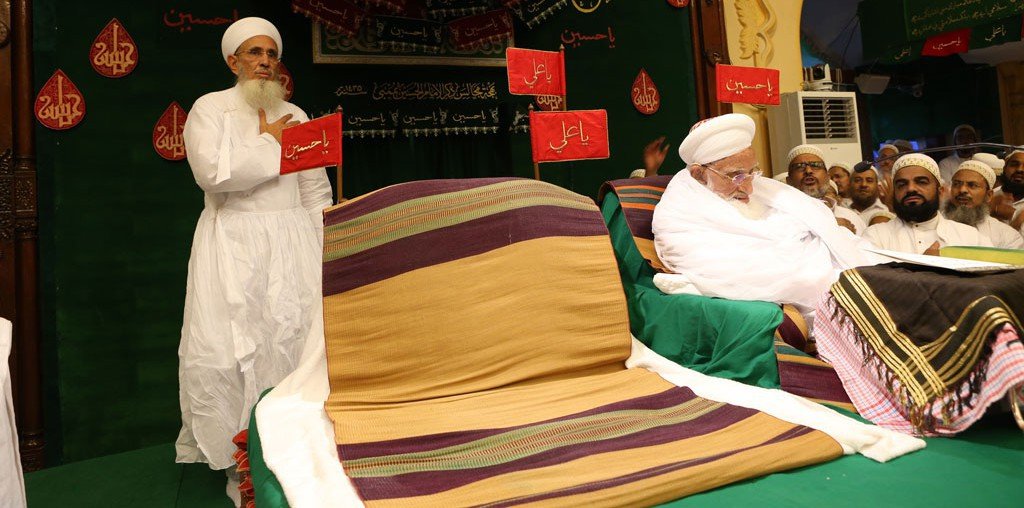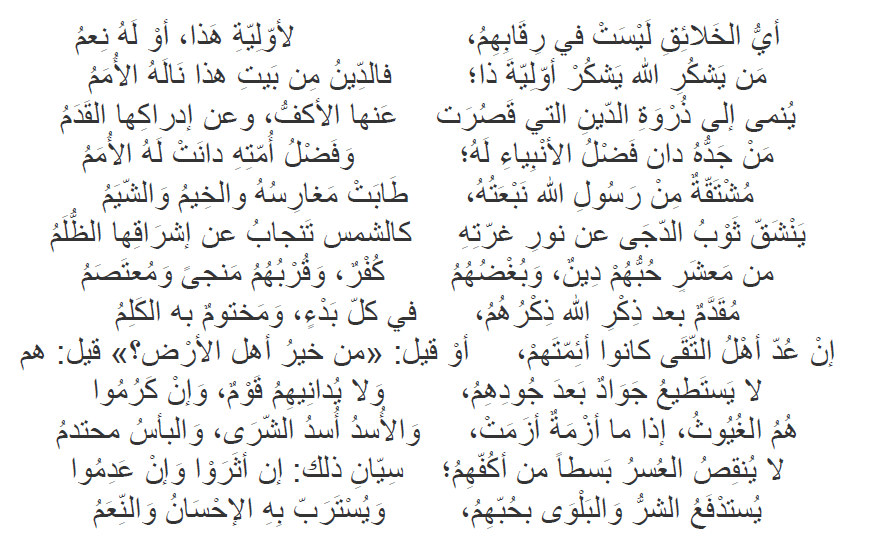A Pilgrimage Interrupted: Hisham’s Struggle at the Kaaba
Imam Ali Zain al-Abedeen (AS) went to the Mecca to perform the Hajj pilgrimage. Meanwhile Hisham ibn Abd al-Malik (the crown-prince of the Umayyad dynasty at the time) went there for the same purpose. Hisham tried his best to reach the Kaaba but he was unable to do that, for the people were overcrowded around it. Every time he would try pushing and forcing his way through – he would be pushed back by the crowd circulating around the Kaaba. He decided to give up and wait till the crowd became less so would be able to go through with ease. A pulpit was installed, and he sat on it. He began looking at the crowds of the people from above. Then Imam Ali Zain al-Abedeen (AS) came to perform his circulation of the Kaaba. When the pilgrims saw him, they were astonished at his humble solemnity and the glow of piety on his face, the face was like that of his grandfather, Prophet Muhammad SAW, may God bless him and his family.
The Radiant Arrival of Imam Ali Zain al-Abedeen (AS)
The people were shouting: “There is no god but God! God is great!” – With profound respect – they parted, made way for him and allowed him to pass through to kiss the Kaaba. The Syrians were astonished when they saw that situation. The pilgrims saw the people did not receive Hisham, the nominated caliph after his father, warmly though the Syrians honoured him, and the Caliph’s guards surrounded him.
The Crowd Parts for the Grandson of the Prophet (SAW)
One of Hisham’s companions from Syria asked him: “Who is that man whom the people have honoured very much?” Hisham was hurt and pretended not to know the Imam and angrily, shouted at the man, saying: “I do not know him!”
Hisham’s Ignorance
The great Arab poet Al-Farazdaq was there. He knew that Hisham was lying. He could not control himself at this insult to the great Imam. Thus, he said to the Syrians: “I know him.” “Who is he, Abu Firas?” The Syrians asked. Hisham shouted at al-Farazdaq, “I do not know him!” “Yes, you know him.” replied al-Farazdaq. Then he rose and composed the following poem whose effect was stronger than the hitting of the swords and the stabbing of the spears against Hisham.
Al-Farazdaq’s Bold Response and Poetic Tribute
He said:
The Glowing Praise of Imam Ali Zain al-Abedeen (AS)
(Translated)
This is the son of Husayn and the grandson of Fatima the daughter of the Apostle through whom the darkness dispersed.
This is he whose ability the valley (of Mecca) recognizes, He is known by the (Sacred) House and the Holy sanctuary and the lands outside the sanctuary.
This is the son of the best of God’s servants.
This is the pure pious man, the pure eminent man. When the Quraysh saw him, their spokesman said: Liberality terminates at the outstanding qualities of this (man).
He belongs to the top of glory which the Arabs of Islam and non-Arabs fall short of reaching.
When he comes to touch the wall of the Kaaba, it almost grasps the palm of his hand.
He takes care to be modest and he is protected from his fears.
He only speaks when he smiles.
There is a cane in his hand. Its smell is fragrant from the hand of the most wonderful (of all the people), who is proud.
The prophets yielded to his grandfather’s favour.
The nations yielded to the favour of his community.
The light of guidance emanates from the light of his forehead.
He is like the sun whose shining disperses darkness.
His family tree belongs to the Apostle of God. Its elements, its natures, and its qualities are good. This is the son of Fatima if you do not recognize him. His grandfather was the seal of Prophethood.
God honoured and favoured him from antiquity.
Your words ‘who is this?’ do not harm him.
All the Arabs and non-Arabs recognize him whom you deny.
Both his hands are relief.
Their advantage has prevailed.
The hands are just.
Nonexistence does not befall them.
He is the carrier of the burdens of the people when they are oppressed.
His qualities are good.
The ‘yes’ is sweet with him.
He does not break a promise.
His soul is blessed.
His courtyard is wide.
He is intelligent when he decides.
He is from the people whose love is religion, whose hate is unbelief, whose approach is refuge and protection.
If the God-fearing are numbered, they are their Imams.
If it is said who are the best of the earth, it is said they are.
No generous man can reach their far purpose.
No people, though generous, can compete with them (for generosity).
They are rain when a crisis happens.
They are lions when fear becomes intense.
Poverty does not decrease the relief from their hands.
That is the same, whether they are rich or poor.
Misfortune and tribulation are driven away through their love.
Kindness and the blessings are regained through it.
In every affair their praise is after the praise of God. The speech is ended by it.
Abasement refuses to stop at their space.
Their natures are noble, and their hands are full of liberality.
None of mankind has within their souls such primacy as he does or such grace as he does.
Whoever knows God, knows His friend. Our Religion came from the House of this man.
Thus, the poet recited to the present pilgrim his rich poetry laden with lavish praise.
Hisham’s Envy and Anger: The Umayyad Crown-Prince’s Reaction
Hisham’s anger knew no bounds. It reached the extreme limit. He said to Farazdaq: “Oh al-Farazdaq! so much praise for Zayn al-Aabideen? And not even half of such praise for us, the leaders of the Umayyah? You have been receiving annual stipends from the Umayyad Caliphs, and you have been composing poetry, but you have never sung any praise to this extent for us.”
The poet replied: “What? Was I singing the praises of the Imam? Who am I, and do I deserve to sing divine praises? Indeed, his praises shine in the very lanterns of the Universe. Look at this wall of Baytullah! At the time of the birth of his great-grandfather, these walls had burst, and we are but mere human beings. Should our hearts therefore not burn with the love for the Imam? He whose heart burns not with the love of Ali (Asadullah– the Lion of God) such a heart is like an abode void of light.”
Following this, al-Farazdaq followed with a forceful question: “At the time of the riots in Medina when your grandfather Marwan’s life was in danger, in whose house had you sought shelter?”
Al-Farazdaq’s Defiant Stand: The Poet’s Defense of the Imam
And then folding his hands in humility, he went on: “You were saved when you had shelter under the wing of Imam Zayn al-Aabideen (as). What, have you forgotten that so soon? And your praises? What a comparison? Oh Hisham, was your father like his father? Was your grandfather like his grandfather? Does your grandmother command the same respect which his grandmother does? Your grandfather like his grandfather? Tell me, show me that he was, and I shall sing his praises. But glory be to Allah, the Creator of the Universe, that none has hitherto been like the Imam, his ancestors nor any one shall ever be.”
The Generosity of Imam Ali Zain al-Abedeen (AS)
During this encounter between al-Farazdaq and Caliph Marwan, Imam Ali Zain al-Abedeen (AS) was not present physically, but he was informed of it after some time. He was further informed that the Umayyad Caliph had withheld al-Farazdaq’s stipend, and that he had been imprisoned in the prison of Asfan between Mecca and Medina. The Imam sent him a generous gift of 12,000 dirham to the poet. The poet, returning the gift, humbly submitted to Imam Zayn al-Aabideen (as), “Oh Mawla! I did not praise thee and thy ancestors for the sake of money but only to have Allah and His Prophet pleased with me!” In reply, Imam Ali Zain al-Abedeen (AS) sent the gift back to Farazdaq with the message: “We who are Ahlul-Bayt (AS) do not accept back the gift already bestowed.” Therefore, Farazdaq, accepted the gift. Thereafter, having lost the stipend of 1000 dirham from the Umayyad Caliph, he began to receive a stipend of 2000 dirham from the Imam (AS).
The Legacy of Al-Farazdaq’s Tribute: Reverence and Reward
Even when the Umayyads deported the poet to Basra, he continued to receive the stipend and for the rest of his life, he became the fortunate recipient of the Imam (AS)’s grace for his spiritual and worldly well-being. Such is the Imam of the Time, Magnanimous and Merciful who takes care of the believers always.


